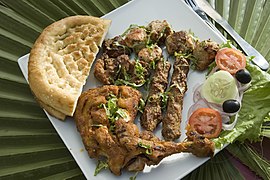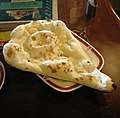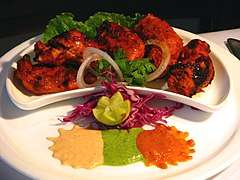Pakora
Pakora (pronounced [pəˈkoːɽaː]), also called pikora, pakoda, pakodi, fakkura, bhajiya, bhajji, bhaji or ponako, is a fried snack (fritter), originating from the Indian subcontinent.[1][2] It is a popular snack across the Indian subcontinent, where it is served in restaurants and sold by street vendors.[4] It is also often found in Indian restaurants as well as South Asian restaurants in the Western world.
.jpg) | |
| Alternative names | Pakoda, Pikora, bhajiya, pakodi, ponako, pakura, fakkura, phulauri |
|---|---|
| Type | Fritter |
| Course | Appetizer or snack |
| Place of origin | Indian subcontinent[1][2][3] |
| Region or state | Indian subcontinent |
| Associated national cuisine | Indian, Bangladesh, Pakistan, Nepal |
| Main ingredients | Onions, Potatoes, Chilli Flakes, Gram Flour, Water, Corriander Leaves, Dried Coriander, Garam Masalah Powder, Red Chilli Powder & Lemon Juice. |
| Variations | Potato, onion, cauliflower, spinach, mixed vegetables, paneer, bread, chicken |
| Similar dishes | Kyet thun kyaw |
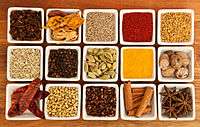 |
| This article is part of the series on |
| Indian cuisine |
|---|
|
Regional cuisines
|
|
Ingredients, types of food
|
|
See also
|
|
Related cuisines |
|
Etymology
The word pakoṛā is derived from Sanskrit पक्ववट pakvavaṭa,[5] a compound of pakva ('cooked') and vaṭa ('a small lump') or its derivative vaṭaka, 'a round cake made of pulse fried in oil or ghee'.[6]
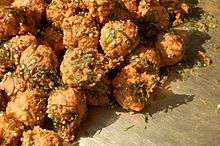
Some divergence of transliteration may be noted in the third consonant in the word. The sound is a hard 'da' in the Telugu language and the 'ra' sound would be an incorrect pronunciation. The sound is the retroflex flap [ɽ], which is written in Hindi with the Devanagari letter ड़, and in Urdu with letter ڑ.
However, in the International Alphabet of Sanskrit Transliteration, the Hindi letter ड़ is transliterated as <ṛ>, popular or non-standard transliterations of Hindi use <d> for this sound, because etymologically, it derives from ड /ɖ/. The occurrence of this consonant in the word pakora has given rise to two common alternative spellings in English: pakoda, which reflects its etymology, and pakora, which reflects its phonology.
Names
In Maharashtra it is known as bhaji, in Andhra Pradesh/Telangana and Karnataka, such preparations are known as bajji rather than pakora. Usually, the name of the vegetable that is deep-fried is prefixed to bajji. For instance, potato bajji is sliced potato wrapped in batter and deep-fried. In these Indian states, pakoda is taken to mean a mix of finely chopped onions, green chilis, and spices mixed in gram flour. This is then rolled into small balls or sprinkled straight in hot oil and deep-fried. Pakodas are very crisp on the outside and medium soft to crisp inside. There is a variety that is softer overall, usually termed media pakoda in restaurants, that is made from any other ingredient, such as potatoes.
Preparation
Pakoras are created by choosing one or two main ingredients, such as onion, eggplant, potato, spinach, plantain, paneer, cauliflower, tomato, or chili pepper. They are also occasionally prepared with bread,[7] buckwheat, groundnut, fish, or chicken. They are dipped in a batter made from gram flour (chickpea / garbanzo bean flour) and then deep-fried. The most popular varieties include pyaaz pakora[8], made from onion, and aloo pakora, made from potato. Other variations include paalak pakora, made from spinach, and paneer pakora, made from paneer (soft cottage cheese). When onions, on their own, are prepared in the same way, they are known as onion bajji. A variation of pakora made from gram flour, fenugreek leaves and salt is called "Fulavda", popular preparation of "bhajiya" in Gujarat. Another variation is made with wheat flour, salt, and tiny bits of potato or onion (optional), is called noon bariya (nūn = salt) (Hindi: नूनबरिया), typically found in eastern Uttar Pradesh in India.
Serving
Pakoras are usually served as a snack or appetiser. They are also often served with masala chai to guests arriving to attend Indian wedding ceremonies, and are usually complemented with tamarind, chutney or raita. In the United Kingdom, pakoras are popular as a fast-food snack, available in restaurants that serve cuisines from the Indian subcontinent.
Gallery
- Pakoras with curry sauce in Zürich.
 Close-up of pakora containing spinach.
Close-up of pakora containing spinach. Banana pakora, made from green raw banana slices dipped in Singhara flour (water chestnut flour).
Banana pakora, made from green raw banana slices dipped in Singhara flour (water chestnut flour). Onion pakora.
Onion pakora. Groundnut pakora.
Groundnut pakora. Buckwheat pakora, which are made during Hindu fasting seasons and holidays.
Buckwheat pakora, which are made during Hindu fasting seasons and holidays.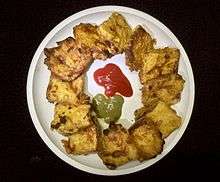 Bread pakora, made by deep-frying bread slices coated with gram flour.
Bread pakora, made by deep-frying bread slices coated with gram flour.
See also
- Related Indian food
- Batata vada – Indian vegetarian fast food from Maharashtra
- Bonda
- Bread pakora – An Indian fried snack
- Chutney – Condiments associated with South Asian cuisine made from a highly variable mixture of spices, vegetables, or fruit
- Gulgula – U.P. traditional sweet doughnut
- Masala chai – Flavoured tea beverage made with aromatic spices and herbs
- Samosa – Fried or baked pastry with a savoury filling
- Vada – Category of savoury fried snacks from India
- Other similar food
- Burmese fritters – Battered and deep fried savory fritters of vegetables or seafood
- Abura-age – Deep-fried tofu slices
- Corn fritter
- Croquette – small breadcrumbed fried food roll
- Crab cake – American crab dish
- Falafel – Traditional Egyptian food: deep-fried balls of ground chickpeas or fava beans.
- Fritter – Fried pastry usually consisting of a portion of batter with a filling
- Ganmodoki – Tofu fritter made with vegetables
- Haggis pakora – Scottish snack food of haggis ingredients prepared as pakoras
- Hushpuppy – Deep-fried savory food made from cornmeal batter
- Korokke – Japanese croquette
- Tater tots – Cylindrical pieces of deep-fried grated potatoes
- Tempura – Japanese dish of battered deep-fried fish or vegetables
- Veggie burger – Hamburger-like sandwich made from vegetables
References
- "Pakora - food". Britannica.com. Retrieved 23 January 2018.
- Bloom, Leora Y. (10 May 2016). "Pakoras are tasty, versatile treats from India that work well as appetizers, snacks or meals". The Seattle Times. Retrieved 23 January 2018.
- Sanghvi, Vir (18 April 2015). "Take pride in the bonda or pakora. It is our gift to the world". Hindustan Times. Retrieved 23 January 2018.
- Devi, Yamuna (1999). Lord Krishna's Cuisine: The Art of Indian Vegetarian cooking. New York: E. P. Dutton. pp. 447–466, Pakoras: Vegetable Fritters. ISBN 0-525-24564-2.
- R. S. McGregor, ed. (1997). The Oxford Hindi-English Dictionary. Oxford University Press. p. 588. ISBN 978-0-19-864339-5.
- Monier-Williams, Monier (1995). A Sanskrit-English Dictionary. Delhi: Motilal Banarsidass. p. 914. ISBN 81-208-0065-6. Retrieved 30 June 2010.
- Arora, Ritu (2002). Healthy Kitchen: More Than 350 Oil Free Recipes. New Delhi, India: B. Jain publishers (P) Ltd. pp. 186, Bread Pakora. ISBN 81-8056-208-5.
- Siddiqi, Kamran. "Mom's Onion Pakora Recipe". Sophisticated Gourmet. Sophisticated Gourmet. Retrieved 24 May 2020.
| Wikimedia Commons has media related to Pakora. |
